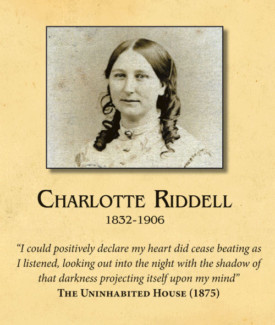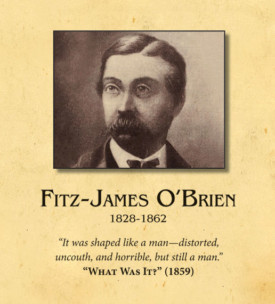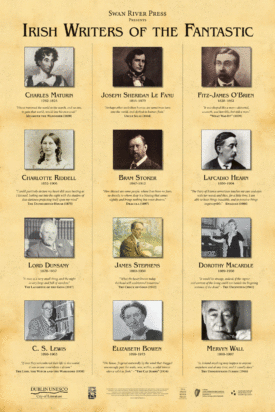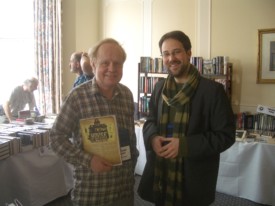Dorothy Macardle (1889-1958)
20 October 2017
“It would be strange, indeed, if the vigour and content of the living could not banish the lingering sorrows of the dead.” – The Uninvited (1941) Dorothy Macardle—historian, playwright, journalist, and novelist—was born in Dundalk, Co. Louth. She was educated at Alexandra College in Dublin where she later lectured in English literature. She is best remembered for her seminal treatise on Ireland’s struggle for independence, The Irish Republic (1937), but also wrote novels of the uncanny, including The Uninvited (1941), The Unforeseen (1946), and Dark Enchantment (1953). She died in Drogheda and is buried in St. Fintan’s Cemetery, Sutton. Novels and Collections Earth-Bound and Other Supernatural Tales (1924) …
Read moreJames Stephens (1880-1950)
19 October 2017
“What the heart knows today the head will understand tomorrow.” – The Crock of Gold (1912) James Stephens was born in Dublin in 1880. Like many young Irish poets of the early twentieth century, Stephens started his career under the tutelage of A.E.; he dedicated his debut poetry collection, Insurrections (1909), to his mentor. In Irish Fairy Tales (1920, illustrated by Arthur Rackham) and Deirdre (1923), Stephens explored the myths and legends of Ireland. His best remembered books are his Dublin novel The Charwoman’s Daughter (1912) and the philosophical fantasy The Crock of Gold (1912). He died in England in …
Read moreLord Dunsany (1878-1957)
18 October 2017
“A man is a very small thing, and the night is very large and full of wonders.” – The Laughter of the Gods (1917) Lord Dunsany (Edward John Moreton Drax Plunkett; 1878-1957) published his first collection, The Gods of Pegāna, in 1905. He followed this with more than sixty volumes of critically acclaimed stories, novels, plays, poems, and translations. A big-game hunter and a sportsman, Lord Dunsany was also a soldier and a highly ranked chess-player; and was the Byron Professor of English Literature in Athens in 1940-41. He was nominated for the Nobel Prize for Literature in 1950. Novels …
Read moreLafcadio Hearn (1850-1904)
17 October 2017
“The Fairy of Science sometimes touches my ears and eyes with her wand; and then, for a little time, I am able to hear things inaudible, and to perceive things imperceptible. – Kwaidan (1904) Born on the Greek island of Lefkada, Lafcadio Hearn (1850-1904) was brought up in both Ireland and England. At nineteen he emigrated to the United States where he became a journalist, first in Cincinnati and later New Orleans. After a sojourn in the French West Indies, he sailed for Japan in 1890. Hearn wrote extensively about his new homeland, its tales, customs, and religions, acting as …
Read moreBram Stoker (1847-1912)
16 October 2017
“How blessed are some people, whose lives have no fears, no dreads; to whom sleep is a blessing that comes nightly, and brings nothing but sweet dreams.” – Dracula (1897) Bram Stoker (1847-1912) was born in Clontarf, Dublin, and educated at Trinity College. As a young man he worked as a civil servant at Dublin Castle, and as an unpaid theatre critic for local newspapers. He is best known today for his classic horror novel Dracula (1897), but during his lifetime he was known as the personal assistant of actor Henry Irving, and business manager of Irving’s Lyceum Theatre in London. …
Read moreCharlotte Riddell (1832-1906)
13 October 2017
“I could positively declare my heart did cease beating as I listened, looking out into the night with the shadow of that darkness projecting itself upon my mind” – The Uninhabited House (1875) Charlotte Riddell (1832-1906)—who often published as “Mrs. J.H. Riddell”—was born in Carrickfergus, Co. Antrim. In 1855 she moved to London and began producing numerous popular novels, most of which are now out of print. However, it is for her Christmas ghost stories that she is still widely read. Many of her best ghostly fictions were collected in the landmark volume Weird Stories (1882), while her uncollected tales …
Read morePreface to Bram Stoker’s Old Hoggen
12 October 2017
Two years after his death, the estate of Bram Stoker issued a posthumous collection of short stories by the late author. Published by George Routledge & Sons, Ltd. in April of 1914, Dracula’s Guest and Other Weird Stories is now a frequently reprinted horror collection, a fine showcase of Stoker’s most macabre, grotesque, and sometimes darkly humorous fictions. He included stories previously published in English and American periodicals, many of them now considered classics of the genre, such as “The Judge’s House”, “Burial of the Rats”, and “The Squaw”. With the exception of “The Gipsey Prophecy”, these stories first saw …
Read moreFitz-James O’Brien (1828-1862)
12 October 2017
“It was shaped like a man—distorted, uncouth, and horrible, but still a man.” – “What Was It?” (1859) Fitz-James O’Brien was born in Cork on 25 October 1828. Little is known of his early life, though he attended Trinity College and, after a short period in London, emigrated to America around 1851. In New York he joined the artistic Bohemian set, and began writing for various magazines, including Harper’s, Vanity Fair, and Atlantic Monthly. At the outset of the American Civil War in 1861, O’Brien joined the New York National Guard. He was wounded in February 1862, and later died …
Read moreJoseph Sheridan Le Fanu (1814-1873)
11 October 2017
“Perhaps other souls than human are sometimes born into the world, and clothed in human flesh.” — Uncle Silas (1864) Joseph Sheridan Le Fanu (1814-1873) was born in Dublin on Dominick Street Lower. He spent his youth in Chapelizod and the rural village of Abington, Co. Limerick. He entered Trinity College in 1833 and was called to the Irish Bar in 1839. Instead of pursuing a career in law, Le Fanu purchased and edited several newspapers including The Evening Mail and The Warder. In 1861 he bought the Dublin University Magazine, which he edited until 1869. He retreated from public life on the death …
Read moreCharles Maturin (1782-1824)
10 October 2017
“I have traversed the world in the search, and no one, to gain that world, would lose his own soul!” –Melmoth the Wanderer (1820) Charles Maturin, novelist and playwright, was born in Fitzwilliam Street on 25 September 1782. In his youth he had a fascination for the gothic novels of Walpole, Radcliffe, and “Monk” Lewis. His early novel, The Milesian Chief (1812), won the praise of Sir Walter Scott; while his play, Bertram (1816), though successful, drew harsh criticism from Coleridge. A lifelong member of the clergy, serving as curate of St. Peter’s Church on Aungier Street, Maturin is now …
Read moreIrish Writers of the Fantastic
5 October 2017
A good while back I posted the image of a poster designed by myself and long-time Swan River conspirator Jason Zerrillo. It features a line-up of Ireland’s most recognisable and possibly most influential writers of fantastic literature. I explained the impetus for the poster’s creation in an earlier post. While I’m pleased with the results, it was not easy choosing who to include and who to leave off. Much as I wanted to indulge in the most obscure and overlooked (Oliver Sherry, anyone?), there is also merit in showcasing the luminaries: a reminder of this island’s contributions to worlds of …
Read moreRemembering Richard Dalby
20 July 2017
The first thing one learned about Richard Dalby as a person was that Richard didn’t use email. Or at least that was the first thing I learned. Communications came by typed letter, occasionally handwritten (especially the later ones when he was having eye trouble), and even, though less frequently for me at least, by telephone. But let’s face it, there’s something quaint and reassuring about getting correspondence in the post. Last week I got out all the letters I could find that Richard had sent to me over the years. While I’m sure we started corresponding earlier, I couldn’t find …
Read more











